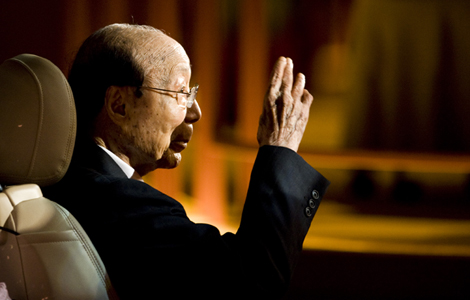Triumph of diplomacy
Updated: 2014-01-14 07:41
(China Daily)
|
|||||||||||
Calling Sunday's agreement between Iran and the P5+1 "an important step forward", US President Barack Obama emphasized that "now is the time to give diplomacy a chance to succeed". Yet he credited "unprecedented sanctions and tough diplomacy" for the development.
Harsh US sanctions, the main cause of Iran's current economic woes, indeed compelled Teheran to make concessions at the negotiating table. But the Geneva talks would not have reached where they are were it not for the shared willingness to give diplomacy a chance.
The Sunday deal is, in US Secretary of State John Kerry's words, a "critical, significant step". By agreeing on how to implement the first phase of the agreement reached on Nov 24, the negotiators indicated that the fragile diplomatic process to resolve the Iranian nuclear issue remains on track. It inspires optimism about a longer-term deal in the near future, too.
Given the less-than-desirable outcomes of recent US military interventions in the Middle East and beyond, a diplomatic solution to the Iranian nuclear issue is of particular significance for Washington's foreign policy.
The Iraq War has been an absolute failure for the US and a nightmare for Iraqis. It has exposed the moral hollowness of the US' Middle East policy and is a bloody illustration of its ineffectiveness. The promised democracy after regime change is still a daydream in Iraq, where national reconciliation remains illusive, violence rules everyday life and terrorism grows ever stronger.
Things are hardly better in Afghanistan, where people fear the worst following US military withdrawal later this year.
Obama seems to have learnt a lesson from his trigger-happy predecessor's failures in Iraq and Afghanistan. His interest in negotiating with Iran is an encouraging break worth an active response from Teheran and the broader international community.
The so-far-so-good diplomatic progress on Iran and Syria indicates the handsome reward diplomacy can deliver. But both processes remain volatile, and the deep-rooted distrust accumulated over the decades could derail them at any time. The US Senate bill to impose fresh sanctions on Iran, for instance, has the potential to invalidate all previous peacemaking efforts.
As US National Security Council spokeswoman Bernadette Meehan correctly pointed out, closing the door on diplomacy would very possibly leave her country to "choose between military options or allowing Iran's nuclear program to continue".
For all parties' benefit, diplomacy has to succeed.
Related Stories
Iran nuclear deal to take effect on Jan 20 2014-01-13 09:43
US, Iran share common ground in Middle East 2014-01-13 08:03
Obama welcomes agreement on Iran nuclear deal 2014-01-13 04:16
New sanctions detrimental to nuclear talks: Iran 2014-01-08 10:22
Today's Top News
China pouring billions into London real estate
Beijing, Sofia vow new initiatives
Bangkok unrest hurts major projects
Army built 'with peace in mind'
UN plea made on war victims
Iran nuclear deal to take effect on Jan 20
Obama welcomes agreement on Iran nuclear deal
Unexpected sharp fall in tourism hits Beijing
Hot Topics
Lunar probe , China growth forecasts, Emission rules get tougher, China seen through 'colored lens', International board,
Editor's Picks

|

|

|

|

|

|





